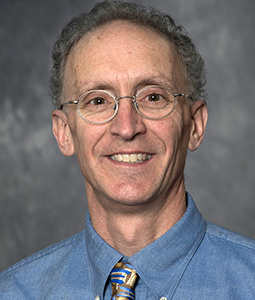College of Pharmacy
- SC.edu
- Study
- Colleges and Schools
- College of Pharmacy
- Faculty and Staff
- Michael Wyatt
Faculty and Staff
Michael D. Wyatt, Ph.D.
| Title: | Chair, Department of Drug Discovery & Biomedical Sciences Professor |
| Department: | Drug Discovery & Biomedical Sciences (DDBS) College of Pharmacy |
| Email: | wyatt@cop.sc.edu |
| Phone: | 803-777-0856 |
| Office: | College of Pharmacy 715 Sumter Street - CLS 609 Columbia, SC 29208 |

Administrative Responsibilities
The department chair for Drug Discovery and Biomedical Sciences, appointed by and reporting to the dean of the College of Pharmacy, leads department operations and oversees faculty matters in teaching, research, and service. Academic leadership responsibilities and key operational duties include implementing university policies, department planning, conducting annual reviews, assigning departmental duties to faculty and staff, establishing workload evaluations, creating department policies, and overseeing budget and resources.
The chair is responsible for appointments and non-reappointments, promotions, and tenure, except as delegated to the faculty in the faculty manual. The chair approves research projects and effort reporting and ensures compliance with university policies. The chair also serves as advisor and mentor to faculty members, assists with student academic concerns, and maintains professional relationships with external partners. Working with administration, the chair manages contractual agreements and space allocation while fulfilling additional duties assigned by senior leadership.
See: Our Administration
Education
Ph.D. Molecular Pharmacology, University College London, 1996
M.S. Chemistry, Furman University, 1992
B.S. Chemistry, Furman University, 1991
Postdoctoral Fellowship, Harvard School of Public Health, 1996-1999
Background
Michael Wyatt Ph.D., is a professor and chair of the Department of Drug Discovery and Biomedical Sciences at the University of South Carolina College of Pharmacy. He received his B.S. and M.S. in chemistry from Furman University with Professor Moses Lee and completed his Ph.D. in the Department of Oncology at University College, London, School of Medicine, with Professor John Hartley. Wyatt completed an NIH individual postdoctoral fellowship in the lab of Professor Leona Samson in the Department of Molecular and Cellular Toxicology at Harvard School of Public Health in Boston before joining the University of South Carolina in 1999.
Dr. Wyatt has been nearly continuously funded by NIH research grants as PI or co-PI since arriving at USC. He has published over 85 papers. Through many collaborations, his research has centered on his fascination with molecular pharmacology, namely elucidating how drugs, carcinogens, nanoparticles, etc. produce medicinal/biological effects. This fascination has defined his research interests, his passion for teaching pharmaceutical sciences in the College of Pharmacy, and his eagerness to train undergraduates and graduate students in research.
Research Interests
- Small molecule/Drug mechanism of action
- DNA repair
- Drug discovery
- Cancer research
Research Lab
The Wyatt laboratory utilizes biochemical and cellular techniques to determine the mechanism of action for small molecules, carcinogens, nanoparticles, and drugs. Collaborative projects include structure guided approaches for drug and chemical probe discovery, pharmacogenetics-based studies of approved drugs to better personalize drug therapies for individual patients and their tumors, and mechanism of action studies for small molecules discovered by artificial intelligence for repurposing as neuroprotective agents.
Awards & Honors
- NRSA Individual Fellowship Award, NIH/NCI, F32 CA73135
- “Transition to Independent Positions” Award, NIH/NIEHS, K22 ES00333
- Distinguished Research Service Award, University of South Carolina, 2019
- Professor of the Year, USC College of Pharmacy, 2024
- Best Professor - College of Pharmacy, Best of Carolina Awards, 2024
- P1 Teacher of the Year, USC College of Pharmacy, 2023, 2019, 2018
- Member, Phi Lambda Sigma, Pharmacy Leadership Society, 2017
- “Extra Mile” Award, South Carolina College of Pharmacy, 2015
Chapagai, D. Merhej, G., McInnes, C.*, Wyatt, M.D.* (2023). Structural basis for variations in PLK1 conformation and intracellular stability induced by ATP competitive and novel noncompetitive abbapolin inhibitors. ACS Chemical Biology. 18(7):1642-1652. doi/full/10.1021/acschembio.3c00269. PMID: 37433100.
Graduate student and first author Danda Chapagai was featured by the journal, “Introducing Our Authors.”
Cui, B.C., Aksenova, M., Sikirzhytskaya A., Odhiambo, D, Korunova, E., Sikirzhytski V., Ji, H., Altomare, D., Broude, E., Frizzell, N., Booze, R., Wyatt, M.D., Shtutman, M. (2024). Suppression of HIV and cocaine-induced neurotoxicity and inflammation by cell penetrable itaconate esters. Journal of NeuroVirology. 30(4), 337-352. doi: 10.1007/s13365-024-01216-9. PMID: 38884890
Castillo-Arellano, J., Stryker, Z., Wyatt, M.D., Leon, F. (2024). Synthesis and monoamine oxidase inhibitory activity of halogenated flavones. ACS Med. Chem Lett. May 9 15(5): 565-745. PMID: 38746894. DOI: 10.1021/acsmedchemlett.3c00573
Cummings, T., Magagnoli, J., Sikirzhytskaya, S., Tyagin, I., Safro, I., Wyatt, M.D., Shtutman, M., Sutton, S.S. (2024). Exposure to angiotensin-converting enzyme inhibitors that cross the blood-brain barrier and the risk of dementia among patients with human immunodeficiency virus. AIDS. 38 (15) 1999-2009. PMID: 39250700. DOI:10.1097/QAD.0000000000004009.
Magagnoli, J., Cummings, T., Wyatt, M.D., Shtutman, M., Sutton, S.S. (2024). Schizophrenia, Off-Label Antipsychotics, and Dementia Risk in People with HIV. JAIDS. 98(2):133-142. PMID: 39418469 DOI: 10.1097/QAI.0000000000003545
VanderVeen, B., Cardaci, T., Bullard, B., Unger, C., Freeman, J., Enos, R., Shtutman, M., Wyatt, M.D., Fan, D., Murphy, E.A. (2025). The impact of diet induced obesity on 5- fluorouracil-induced tumor and liver immune cell cytotoxicity. American Journal of Physiology-Cell Physiology. 328 (1):C56-C77. PMID: 39570672. https://doi.org/10.1152/ajpcell.00687.2024
Stryker, Z.; Castillo Arellano, J.; Cutler, S.; Wyatt, M.D.; Leon, F. (2025). Semi-Synthesis of Dimeric Cannabidiol Derivatives and Evaluation of their Affinity at Neurological Targets. Journal of Natural Products. 88(2), 397-414. https://doi.org/10.1021/acs.jnatprod.4c01174, PMID: 39854244
Chapagai, D., Strebhardt, K, Wyatt, M.D., McInnes, C. (2025). Structural Regulation of PLK1 Activity: Implications for Cell Cycle Function and Drug Discovery. Cancer Gene Therapy, 32(6):608-621. doi: 10.1038/s41417-025-00907-7. PMID: 40379873. PMC12183085.
Sikirzhytskaya, S., Tyagin, I. Sutton, S.S. Wyatt, M.D., Safro, I., Shtutman, M. (2025). AI-based mining of biomedical literature: Applications for drug repurposing for the treatment of dementia. Artificial Intelligence in Medicine. 168, 103218. doi: 10.1016/j.artmed.2025.103218 PMID: 40674898.